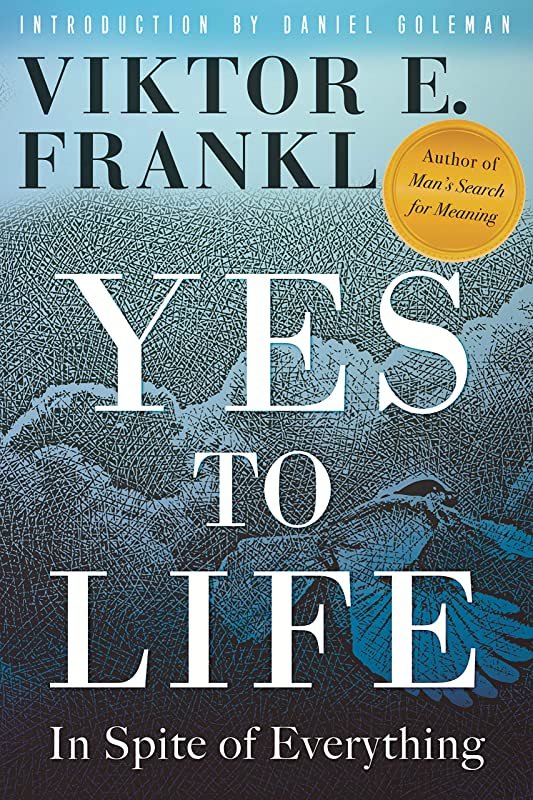Yes to Life – by Viktor Frankl
Date read: 2/1/23. Recommendation: 8/10.
Based on a series of lectures Frankl gave after his liberation from Nazi concentration camps. It’s a great companion book to Man’s Search for Meaning. Frankl explores the three ways to find meaning and purpose in life—through action, love, and suffering.
See my notes below or Amazon for details and reviews.
My Notes:
3 ways to find meaning and purpose in life:
Action: Doing, creating, working (whether it’s art or a labor of love), something that outlasts us. Bringing something into being.
Love: Experiencing something—appreciating nature or works of art—or loving people. The door to happiness always opens outward.
Suffering: How a person adapts and reacts to unavoidable limits on their life possibilities like facing death or enduring concentration camps. This opens itself to a person when finding value in 1 and 2 are closed to them.
“If I am not for myself, who will be for me? If I am not for others, what am I? And if not now, when?” Rabbi Hillel
Each of us has our own purpose in life, our own places where we find meaning, and serving others only elevates this.
Materialism is an anti-pattern. Mindlessly consuming and always focusing on more things leads to a meaningless life.
Love:
“It is not only through our action that we can give life meaning—insofar as we can answer life’s specific questions responsibly—we can fulfill the demands of existence not only as active agents but also as loving human beings: in our loving dedication to the beautiful, the great, the good.” VF
Consider when you attend a concert of an artist you love and they play your favorite song and it sends chills down your spine. That moment is meaningful. And it’s born of a deep appreciation.
Suffering:
“How we deal with difficulties truly shows who we are, and that, too, can enable us to live meaningfully.” VF
“What do athletes do but create difficulties for themselves so that they can grow through overcoming them? Of course, it is not advisable to create difficulties for oneself; in general; suffering as a result of misfortune is only meaningful if this misfortune has come about through fate, and is thus unavoidable and inescapable.” VF
“So, fate is part of our lives and so is suffering; therefore, if life has meaning, suffering also has meaning. Consequently, suffering, as long as it is necessary and unavoidable, also holds the possibility of being meaningful.” VF
“It is not a question of either achievement or endurance—rather, in some cases, endurance itself is the greatest achievement.” VF
Perspective:
“Our perspective on life’s events—what we make of them—matters as much or more than what actually befalls us. ‘Fate’ is what happens to us beyond our control. But we each are responsible for how we relate to those events.” Daniel Goleman
“Life is not something, it is the opportunity for something.” Hebbel
“The individual, and only that individual, determines whether their suffering is meaningful or not.” VF
Adaptability:
“In the course of life, human beings must be prepared to change the direction of this fulfillment of meaning, often abruptly, according to the particular challenges of the hour.” VF
Life is motion: “For we have already pointed out that meaning of life can only be a specific one, specific both in relation to each individual person and in relation to each individual hour: the question that life asks us changes from both person to person and from situation to situation.” VF
Frankl’s manuscript:
“Frankl held these insights on the singular importance of a sense of meaning even before he underwent the horrors of camp life, though his years as a prisoner gave him even deeper conviction. When he was arrested and deported in 1941, he had sewn into the lining of his overcoat the manuscript of a book in which he argued for this view. He had hoped to publish that book one day, though he had to give up the coat—and the unpublished book—on his first day as a prisoner. And his desire to one day publish his views, along with his yearning to see his loved ones again, gave him a personal purpose that helped keep him afloat.” Daniel Goleman
Frankl formulated his initial insights and theory on the human orientation towards meaning in a rough manuscript of his eventual book The Doctor and the Soul. This is the same manuscript he brought with him after his deportation, hoping that he would be able to publish it still. When he reached the concentration camp, he was forced to give up his coat with the manuscript sewn into the lining.
His experience in the camps further refined his ideas: “It turned out, in fact, that those camp inmates who still recognized or at least hoped for a meaning in life were the most likely to find the strength to continue living, or finally to survive. Last, but not least, that was also true of himself: what kept him alive was only the hope of seeing at least some of his loved ones again and bringing the completed draft of his book to publication.” VF

